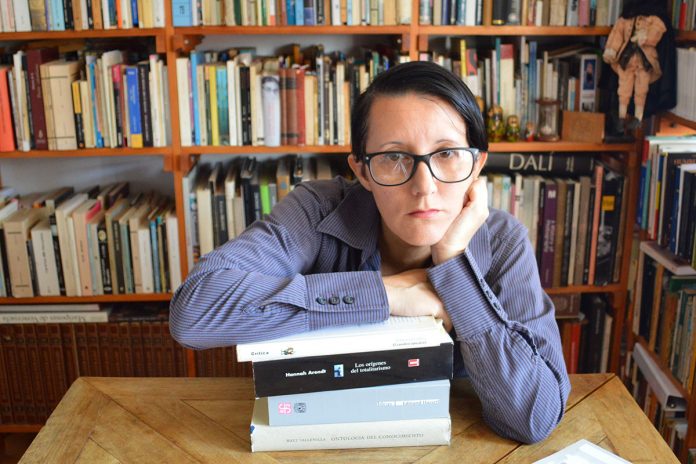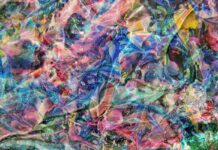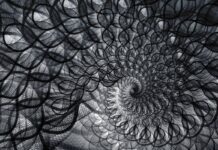Translated from Spanish by : Billy B. Thompson
1. Switchblades on the Table
Let’s put two switchblades on the table.
Look at them and don’t let their sparkle get into
your eyes, they’d think they can show us their right
to wound us, to take part in how to slash us at the
moment of our enjoyment.
Each one of us with two capsules in our hearts, ready to take
them guardedly, one at breakfast and the other before
going to be on Sunday, they order our appalling routine
of walking around like ghosts.
Two switchblades made out of earth, with the fragrance of pollen, a
frightening loveliness trying to get away from our body.
2. Outside the Body
In the gap of the body, the smallest of heads appears.
The body contracts, a woven quiet nest, rips open.
Covered in filth he emerges, one side of his mouth hangs
tenderly to the right.
Never did I make ready a crib, there was no need.
3. Silence
The smiles of the suicides hang in the bathroom mirrors.
Hanging on hooks like a bunch of peaches, their last mien
hold the blackness of their despair. All cherishing cut
away; yellow slices that disappear at the bottom of a
plate.
A fear of the silence of loneliness shouts in vain, saddened
from within. Can that bitterness be measured?
Unblemished, a final silence takes over the bathroom.
4. And With No Appealling (To Chantal Sébire*)
Hanging at the edge of the bed, her dream that never came to be,
now live on.
For the last time you shall have folded up the blanket that your
mother gave you, for the last time you shall watered your plants
and felt the coldness of obedience, the bitter taste of the
pills, the impotence of radiation is the road to blindness.
In the mirror you no longer can see yourself in that tormented
monster. Can anyone comprehend the incur-
able taste of blood. The weight of your face is
an exploded apple that boils in the open air. Of course,
the days of your life cannot be destroyed. What a lot of fear
can they engender!
There can be no peace of mind, the trial courts write one abomination after another,
judicial judgments with no sense of hope are smiles
torn asunder and swallow up the silence and close off
the doors with fear.
You wait quiet and insignifcantly for the mutilated No. Therefore,
this afternoon, and with no appealling, you shall double the dosage for euthanasia,
the breathing will become more shallow, you shall place her slowly
on the table, alone, untouched, the pain shall end.
(* On 19 March 2008, Chantal Sébire was found dead at home. This professor suffered from a rare, incurable, deforming, and painful cancer; it left her an invalid. Two days before her death, a French court forbade her appeal for euthanasia. Her case reopened in France the debate over the right to die with dignity and the rights of patients with incurable diseases
5. Cremation
The bare cigarette-burns remain as unspeakable marks on the palm of my hand.
Between the index and middle fingers you can hold a tree alit.
The ashes, those orange worms, await while dying
on the table the voiceless silence of breathing,
exploding into hostile piranhas.
To refresh innocently and burning painfully
madness, such a provocative caress.
Two hours waiting, three cups of coffee, twenty perfectly
round vials of medicine.
6. Bloody
The innocuous screeching of the brakes didn’t help.
The collision of a truck with a motorcycle left its tracks
on the asphalt.
The bike sleeps rolled up on the concrete. Where
is the boy? The murmurs from the people seem
like prayer as they look for him. They can’t see him.
A carriage with a baby in it is crossing at the next
corner, over a flawless, velvet rug, with red and
brown arabesques.
About the author:
Maria was born at Los Teques, Venezuela in 1974. Works as an academic at Catholic University Santa Rosa and is a well known contemporary Latin American poet.
Maria’s poetry collections in Spanish include: Navajas sobre la mesa, (bid&co, editor, 2009), Quemaduras (Grupo Editorial Eclepsidra, 2004) , y En el barro de Lesbos (Ediciones Funsagu, 2002), Éramos malos y otros textos agrios (Ediciones Funsagu, 2002) etc.
The latest collection of her poetry will be published in November 2017.
Maria’s poetry have been translated into English, German & Portuguese and her research work has covered the Venezuelan philosophy, especially the works of Andrés Bello and Juan Nuño. She is currently a profesor /director at Centro de Investigación y Estudios de la Venezolanidad














